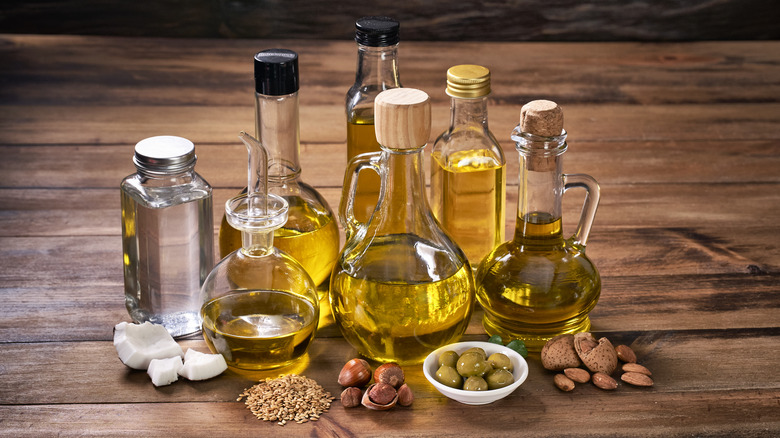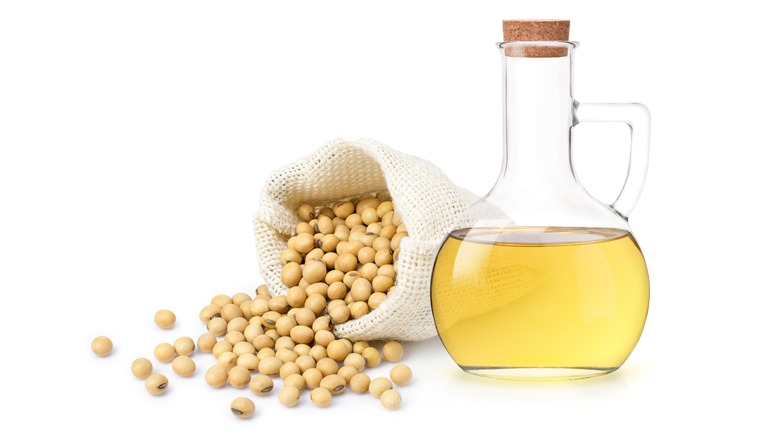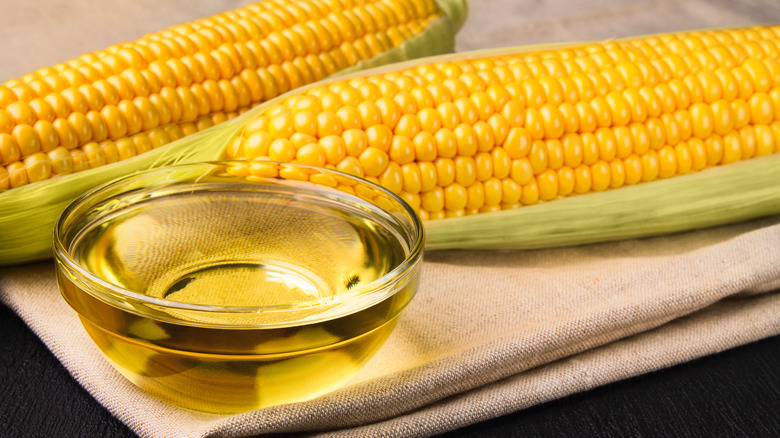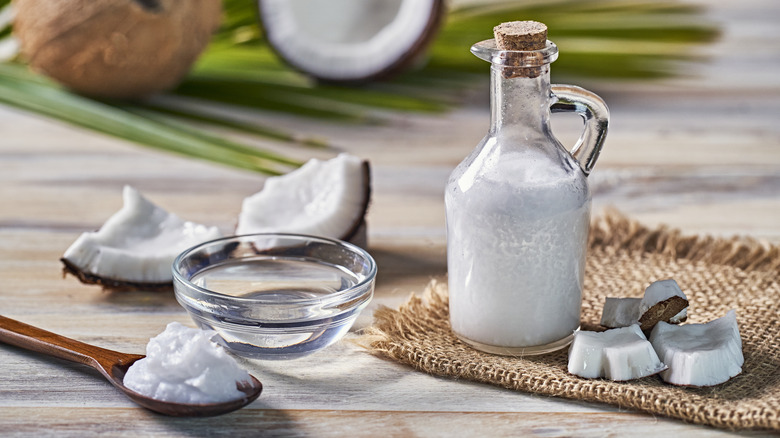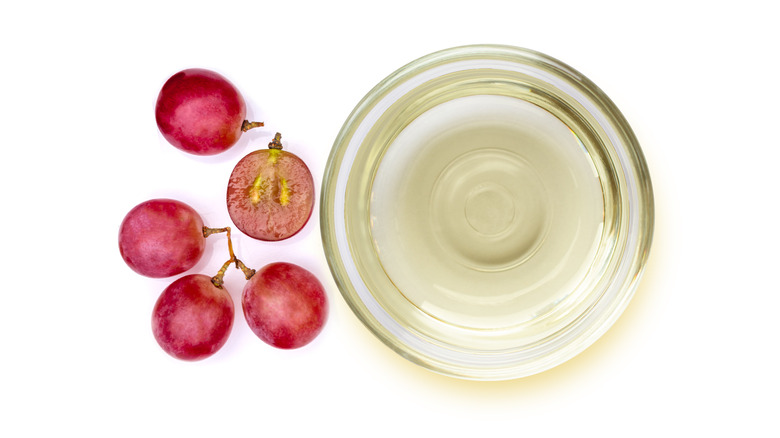The Unhealthiest Oils To Cook With
Fat is a fundamental component in cooking and serves multiple functions. Fat content can not only help to cook food, but it also gives your dishes a better consistency and mouthfeel, making everything feel more satisfying. Fat also gives your food a richer taste, imbuing meals with whatever natural or added flavors are part of whichever fat you choose.
More often than not, if you're in the kitchen, you're using some type of oil to add fat to your dishes. Oils differ from other cooking fats, like butter or margarine, by their liquid consistency at room temperature. This can make them easier to handle, store, and mix into foods.
The good news is that you're not short of oils to choose from when you're cooking. There are dozens of types of oil out there, from strongly-flavored options like walnut and sesame oil that work best in salads or stir-fries to neutral-tasting vegetable oils that you can use for pretty much anything. But just as oils taste different, they can also have different nutritional profiles. Some of them can be healthy, nutritious, and wholesome, but some — even the most innocent-seeming ones out there — can be pretty bad for you, regardless of whether they came from a natural source or not.
Soybean oil
Soybean oil is an incredibly common ingredient. Not only is it widely available for use in domestic kitchens, but it also shows up in a huge number of processed foods and is especially common in baked goods. Part of why soybean oil is so ubiquitous is its combo of flavor and texture. Soybean oil has an incredibly subtle taste, making it very versatile, and it amalgamates well with other ingredients and fats.
Unfortunately, this is bad news for your health. Soybean oil has been found to have an association with numerous high-risk diseases, like diabetes, Alzheimer's, and depression. Additionally, it appears to be especially bad for your gut health by disrupting your microbiome and its natural balance and increasing your levels of unhealthy bacteria, according to research conducted by the University of California Riverside. This appears to be due to the high level of linoleic acid in soybean oil, which contains far more than we need — and because the oil is so widespread, that means our stomachs bear the brunt of it, and the bacteria in our digestive systems are thrown off.
Gut health is important for a number of reasons, and having an imbalance of bacteria can lead to conditions like colitis. "If there's one message I want people to take away, it's this: reduce consumption of soybean oil," stated Poonamjot Deol, an assistant project scientist who conducted the investigation.
Corn oil
Corn is a plant with seemingly infinite culinary uses, as corn kernels, corn starch, and corn syrup are used in many different recipes. Corn is also harvested and processed for its oil. Corn oil is often used for frying, especially deep frying, and its reasonable price and versatility mean that it's pretty widely used.
However, corn oil is far from nutritious, with a few health considerations to keep in mind. The first is its quantity of omega-6 and omega-3 fats. "Both omega-6 and omega-3 polyunsaturated fats are essential for our bodies to function; however, the ratio of each is very important to consider," Michelle Shapiro, a registered dietitian, told Mind Body Green. Omega-6 fats can be inflammatory, whereas omega-3 fats are anti-inflammatory. As corn oil has a large quantity of omega-6 fats, eating too much of this oil can tip the balance in the wrong direction and promote inflammation.
Importantly, too, corn is frequently genetically modified, and question marks exist about the impact of this on the human body. "Because this technology is relatively new, we currently do not have long-term data to determine its potential health effects over time," explains Shapiro. As such, if you're at all concerned about the impact of eating genetically modified crops, you might want to give this oil a miss.
Canola oil
Canola oil is frequently cited as a healthier oil, largely thanks to its fatty acid composition and its abundance of polyunsaturated fats. However, there are certain aspects of canola oil that might make you think twice about ingesting it.
First off, canola oil is a source of trans fats, a type of fat that can be harmful to health. Trans fats are uniquely harmful, as they raise both types of cholesterol in the blood, including the bad LDL kind, according to Diabetes.co.uk. This makes them even worse than saturated fats, which are commonly cited as the worst type of fat.
Canola oil has also been observed, in research published in Nutrients, to be linked with increased rates of metabolic syndrome. The researchers found that when the participants of the study cooked with canola oil, they were more likely to be overweight or obese. The researchers also pointed out that this impact seemed to be in contrast to a previous study, which found that canola oil reduced inflammation and cholesterol. The researchers went on to note that this particular study was funded by the canola industry itself.
Flaxseed oil
You may be confused to see flaxseed oil here, as some say it's one of the healthier oils out there, and the oil does have certain health benefits. Flaxseed oil has a high proportion of omega-3 fatty acids, which makes it beneficial for cardiovascular health, according to Healthline. Additionally, the oil can work wonders for your digestive system in promoting healthy bowel movements.
But — and there's a big but — these benefits are only available if you're consuming raw flaxseed oil. If you're cooking with it, it's a different matter entirely.
Flaxseed oil has an extremely low smoke point and will start to burn at just 225 degrees Fahrenheit. While this makes the oil bitter and produces a nasty smell in your kitchen, it can also make the oil harmful. "Not only can an oil heated beyond its smoke point catch fire, but the molecular breakdown of the oil can create pro-inflammatory free radicals and a carcinogenic compound, acrolein, which may be harmful to your health," Lindsay Wengler, a registered dietitian and certified dietitian nutritionist, told Mind Body Green. You're far better off adding flaxseed oil to salad dressings or smoothies rather than using it in recipes that require heat.
Shortening
Shortening was a common ingredient in American kitchens, and while it's definitely used less than it used to be, it's still a frequent component of some baking recipes. But if you can, we'd recommend substituting it with something else.
Part of the reason why this fat product, made from hydrogenated vegetable oil, has become less popular is because it used to contain high levels of trans fat. While manufacturers have since stopped adding trans fats, shortening still contains levels of saturated fats, which can be a health concern due to their impact on cholesterol.
As well as this, the new method of making shortening, which involves mixing hydrogenated oils with liquid oils to make a new compound called "interesterified fats," may prove pretty unhealthy. An animal study published in Nutrients found that the consumption of interesterified fats seemed to put the liver under considerable strain, potentially leading to fatty liver disease. It's also worth pointing out that unlike other oils — which can have some vitamin content as well as a favorable fat profile — shortening does not, meaning you're getting a lot of calories for not that much reward.
Coconut oil
Coconut oil is often marketed as being a healthy fat. The fact that it comes from a natural, recognizable source — and has so many uses — is likely partly behind its immense popularity. But contrary to widespread belief, it could actually be quite bad for your health.
The issue with coconut oil is its saturated fat levels. In 100 grams of coconut oil, there are well over 80 grams of saturated fat, giving it one of the highest saturated fat proportions out there in cooking fat. In fact, coconut oil has way more saturated fat than butter, which is commonly viewed as unhealthier than plant-based oil.
Sadly, this can have a pretty profound impact on your cholesterol levels. According to MayoClinic, coconut oil can raise both types of cholesterol in your bloodstream, including LDL (or "bad") cholesterol. It's also worth pointing out that many of the positive effects that people claim coconut oil has — like helping with weight loss or improving brain health — are not entirely confirmed. Many scientists are currently unsatisfied with the extent of research into coconut oil's health benefits and are hesitant to throw their weight behind it.
Grapeseed oil
Grapeseed oil is a stable oil with barely any flavor, and it's become a favorite for cooking. But a closer look at its composition could reveal some unsavory implications for your health. Grapeseed oil suffers from the same omega-6 to omega-3 ratio issues as corn and sunflower oil. In fact, it's balance of the two is the worst. This relative lack of omega-3 fatty acids and high amounts of omega-6 can have some serious health consequences.
The issue that's most commonly spoken about is inflammation, with omega-6 fatty acids contributing to it significantly, per Dr. Axe. Inflammation is a factor in pretty much every disease humans experience, and whether it's the root issue or a symptom, it can be a serious health concern (via Fallbrook Medical Center).
Consuming too much grapeseed oil could also contribute to higher levels of cholesterol throughout the body. Plus, the inflammation that the omega-6 fatty acids can get in the way of healthy hormone production. It's probably a better bet to use an oil that has a higher level of omega-3 to cook with, like olive or avocado oil, to limit the risk of these consequences occurring.
Safflower oil
Made from safflower plant seeds, safflower oil has some qualities that make it prized for cooking. With a high smoke point, it's a suitable oil for deep frying and other cooking methods that require high temperatures. Additionally, it has a pretty enviable vitamin E content.
But in other areas, safflower oil is pretty problematic because of its levels of linoleic acid. Linoleic acid is an omega-6 fatty acid, and without other omega-3 fatty acids to balance it out, it can create issues. A review published in the journal Science of Food found that linoleic acid can be particularly harmful to the brain and can increase inflammation in the organ, which may increase the risk of brain-related conditions.
It's worth noting, however, that there are two types of safflower oil, with one healthier than the other. High-oleic safflower oil has more monounsaturated fats in it than high-linoleic acid and, therefore, has lower levels of omega-6 fatty acids. If you can, it might be helpful to opt for the high-oleic version or to opt for a different oil that has a high smoke point.
Sunflower oil
Sunflower oil has had a huge spike in popularity in recent years. More and more food manufacturers have become aware of its usefulness as a frying oil and its ability to be used repeatedly without any apparent deterioration. However, recent research has shined a different light on the oil and what happens when it's heated multiple times. Although sunflower oil has a high smoke point, a study published in Scientific Reports found that when sunflower oil is heated to 365 degrees Fahrenheit again and again, it starts to release compounds called aldehydes. These can be very toxic and produce a range of negative health effects, from inflammation to peptic ulcers and even cell damage and potential death, the Scientific Reports study notes.
In addition to this, sunflower oil can be rich in omega-6 fatty acids. While not all types of sunflower oil contain high levels of omega-6, mid-oleic varieties can be made of up to 35% linoleic acid, which can again prompt inflammation if consumed regularly. If you choose sunflower oil, try to find a high-oleic option, as this will have a favorable fat profile — and try to avoid heating it more than once.
Vegetable oil
Many oils can, of course, be vegetable oils. But when you're dealing with oils that are strictly branded as a "vegetable" variety, you need to be slightly careful. "Vegetable oil is guaranteed to be highly processed. It's called 'vegetable' so that the manufacturers can substitute whatever commodity oil they want — soy, corn, cottonseed, canola — without having to print a new label," explains "The Big Book of Healthy Cooking Oils" author Lisa Howard, per Time.
Vegetable oils are a blend of other oils, usually slightly more cheaply available ones like sunflower and canola oils. And they're processed pretty heavily on their way to the bottle. "Processed oils have been pushed past their heat tolerance and have become rancid in the processing," says Howard. This processing also strips them of any nutrients they may have once had, giving you basically just pure fat and no vitamins that may have existed in the oil before it was mixed and bottled.
Opting for vegetable oil also means that you'll get a tasteless fat. While this might be preferable in cooking in some instances, in others, it can leave your meal a little blander than if you were using olive oil.
Partially hydrogenated oils
Of all the oils out there that you can consume, those labeled as "partially hydrogenated" have to be up there with the worst. "People should avoid partially hydrogenated oils containing trans fatty acids. [They] help maintain a product's shelf life, but they are detrimental to human health," says registered dietitian nutritionist Christine Palumbo via Everyday Health. These oils are harder to find in a bottle in the store, but they used to be commonplace in highly processed foods as a way to extend lifespan and add texture to products at room temperature.
Unfortunately, the hydrogenation process created trans fats — and these are definitely best left uneaten. Trans fat consumption has been associated with a shockingly large number of health conditions, from breast and colon cancer to diabetes to cardiovascular illness (per the Journal of Food Science and Technology). While the United States Food and Drug Administration has ruled that partially hydrogenated oils are no longer acceptable to add to foods due to their potential health impacts, there's still the chance that you might find them in products that you bought a while ago. Additionally, partially hydrogenated oils are still available commercially if you look hard enough — although we would seriously advise against trying to cook with them.
Cottonseed oil
Cottonseed oil may not be as common as olive, avocado, or canola oil nowadays, but this fat has a long history. This oil was actually one of the first vegetable oils to be produced commercially in America, and the product has evolved considerably since its earliest versions. However, while extraction methods may have gotten better, its nutritional aspects have remained the same. Cottonseed oil is, like many other vegetable oils, high in omega-6 fatty acids. It has an especially high amount of linoleic acid and a pretty small proportion of omega-3 acids, and these two factors can increase its potential to prompt inflammation (via Dr. Axe).
Cottonseed oil also has another issue that's quite unique: Pesticides. Unlike some other crops that produce oil, cottonseed oil is a byproduct and a byproduct of a non-food item. Cotton doesn't have the same regulations regarding pesticides as food crops, and therefore, they can be used quite liberally to protect it. Pesticides can be hazardous and present a toxicity risk to humans, and while commercially produced cottonseed will likely not have especially dangerous levels, it's still a consideration. Organic cottonseed oil, on the other hand, will have been produced without any pesticides, so it's best to look for that.
